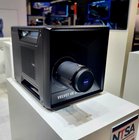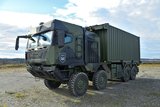Prototype quantum navigation sensor tested on Royal Navy experiments ship
Imperial's quantum accelerometer offers highly accurate location data by using ultra-cold atoms. (Photo: Imperial College)
The quantum sensor has the potential to offer highly accurate location data in GPS and GNSS-free environments.
The solution, a new type of accelerometer, uses ultra-cold atoms to make highly accurate measurements.
Accelerometers measure how an object's velocity changes over time, this, combined with rotation measurements and the object's initial position, allows a current location to be calculated.
However, these sensors drift over time without checking in with an external reference point such as a satellite, diminishing their accuracy.
When cooled, the atoms take on a quantum nature giving them wave-like properties.
As the atoms move through the sensor, a
Access this article and other Decisive Edge Newsletter news content with a free basic account
You will also get one free Premium News article each week
Already have an account? Log in
More from Decisive Edge Newsletter
-
![Final two contenders for key £2 billion British Army training contract selected]()
Final two contenders for key £2 billion British Army training contract selected
The two remaining bidders for the flagship Army Collective Training Service (ACTS) contract will move on to the next 20-week phase to select the British Army's Strategic Training Partner.
-
![Cubic tailors mortar simulator for the US Army]()
Cubic tailors mortar simulator for the US Army
The company’s mortar trainer received improvements based on soldier’s feedback.
-
![I/ITSEC 2024: Zeiss introduces Velvet 4K SIM projector for night flight simulation]()
I/ITSEC 2024: Zeiss introduces Velvet 4K SIM projector for night flight simulation
The next-generation platform is motion-compatible and can be used in OTW and NVG applications.
-
![I/ITSEC 2024: Babcock Immersive Training Experience debuts in US]()
I/ITSEC 2024: Babcock Immersive Training Experience debuts in US
Named BITE, the system simulates the battlefield environment with multiple sensorial stimuli.
-
![What Saudi Arabia’s GCAP involvement could mean for the UK]()
What Saudi Arabia’s GCAP involvement could mean for the UK
Analysts have said that making space for the country in the sixth-gen fighter aircraft initiative could give the UK a chance to ease the financial burden of the aircraft’s development.
-
![Rheinmetall locks in $950 million purchase of US company to strengthen position]()
Rheinmetall locks in $950 million purchase of US company to strengthen position
Rheinmetall is working to open up the US market and the potential billions of dollars on offer. In order to get in the door it has purchased engineering company Loc Performance Products.
























